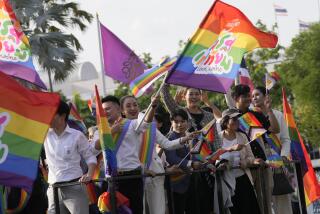Nepal leads South Asia in gay rights
- Share via
KATMANDU, NEPAL — Just eight years ago, Sunil Pant wondered whether there was anyone else in this Himalayan land like him. To his engineer’s mind, it was a riddle to be solved, and he methodically set about doing so.
Pant planted himself in Katmandu’s biggest park and handed out free condoms, seeking to help curb the rising incidence of sexually transmitted diseases. At the same time, through subtle conversations, he teased out an answer to his ulterior question: Were there other gays and lesbians out there?
Not only was the answer an emphatic yes, but from the ad hoc beginnings sprang what is the most successful gay rights movement in South Asia.
In less than a decade, Pant’s Blue Diamond Society has scaled massive heights in a nation known mostly as the home of Mt. Everest. Despite deep-seated social conservatism, the group has won a landmark Supreme Court anti-discrimination ruling, chalked up support for gay rights from two of the biggest political parties and garnered international accolades.
“It’s absolutely astonishing,” said Scott Long, who works on issues of sexuality for Human Rights Watch. “Considering how few resources they have and the depth of prejudice they have to fight against, what they’ve achieved is extraordinary.”
The advances are part of a larger social and political ferment brewing in Nepal, one of the world’s poorest countries. After 10 years of a Maoist insurgency, a peace process and democratic transition are underway.
It will be based on a constitution to be written by a special assembly elected for the task last month. There is a clear sense that everything is up for grabs as Nepal reinvents itself, a rare moment when groups of whatever stripe -- women, ethnic minorities, members of lower Hindu castes -- have a shot at leaving their imprint on the fabric of the state.
“We have a golden opportunity to raise our voice and contribute to this country,” Pant, 35, said of gay, lesbian, bisexual and transgendered Nepalese. “This is a struggle I think this generation has to do, about being brave and honest.”
For years, they were mute. And even now, Nepalese society remains extremely traditional, bound by deeply inscribed values and rigid hierarchies. Conservative mores reign in this majority Hindu country, where millions of uneducated villagers eke out meager livings in near-feudal conditions.
At the beginning, the Blue Diamond Society focused solely on health issues. When an official saw the word “homosexuality” in the group’s application, he told Pant he couldn’t register unless his goal was to turn gay people straight. Pant removed the reference.
But within a few years, Pant concluded that it was impossible to wage an effective battle against HIV/AIDS without also addressing official attitudes toward gays.
A law forbidding “unnatural sex” was rarely, if ever, used to prosecute sexual minorities. Nonetheless, many people said they were harassed by police, who would beat them or extort money. They were sometimes fired or denied housing. Pant launched a drive to document and publicize such cases.
An extraordinary week in 2004 catapulted his cause to the center of public attention. Even conservative Nepalese who don’t approve of homosexuality were horrified by the actions of a policeman who slit the throat of a transgendered person after forcing her to perform oral sex. When 39 members of the Blue Diamond Society were arrested at a protest a few days later, sympathetic media coverage and international outrage stung the government.
That “was a turning point,” Pant recalled. “We became much stronger in responding to violence against us.”
Political recognition was slower in coming. Gay activists joined other nonprofit groups and political parties in agitating against the 15-month absolute rule imposed by King Gyanendra. Yet after popular government was restored in 2006, they found few friends willing to take up their cause in the corridors of power.
“They continually ignored us,” said Pant, who then set his sights on another vehicle for securing gay rights: the judicial system.
With three other civil groups, the Blue Diamond Society filed a petition with the Supreme Court appealing for equal rights and an end to discrimination. “It’s the court’s responsibility to be the eye-opener of society a lot of the time and to lead the government and country,” Pant said.
A favorable outcome was never a sure bet. After one or two hearings, Pant was still trying to explain the difference between gay men, lesbians and transgendered people.
The historic decision came down in December: Members of sexual minorities were “natural persons” deserving of protection from discrimination. The court ordered the government to come up with legislation guaranteeing civil rights for homosexuals and to establish a committee to study legalizing same-sex marriages. Official documents such as national identification cards and passports are to offer a third option for a person’s gender.
Even gay activists were floored by the scope of their victory. “If we ask for 1000%, maybe we’ll get 10%” was the feeling when they filed their petition, Pant said. The ruling put Nepal way ahead of other South Asian nations in terms of official attitudes toward gays and lesbians. In neighboring India, for example, efforts to overturn a Victorian-era law penalizing homosexuality have been unsuccessful.
The court decision here paved the way for further successes. The Nepali Congress Party and also the party of the former Maoist rebels, whose leaders had in the past described gays and lesbians as social “pollutants,” wrote support for gay rights into their platforms.
Violence by the security forces against sexual minorities has dropped, Pant said.
Pant now oversees an operation with more than 50 full-time staff members, funded entirely by donations and grants. Nepal has 10 registered groups catering to the gay community.
“But there’s a lot of work [still] to be done,” said Long of Human Rights Watch. With so many groups clamoring to be represented in the new constitution, he said, “it’s going to be an enormous challenge to meet all those demands with a constitutional solution that actually provides for remedies against discrimination.”
Pant has other headaches as well. A hospice his organization runs for AIDS patients in Katmandu has been evicted four times in 2 1/2 years and is seeking a new home. “We still face problems,” Pant said. “But on the other hand, compared to other countries, it’s quite remarkable that we’ve achieved so much in such a short time.”
--
More to Read
Sign up for Essential California
The most important California stories and recommendations in your inbox every morning.
You may occasionally receive promotional content from the Los Angeles Times.











